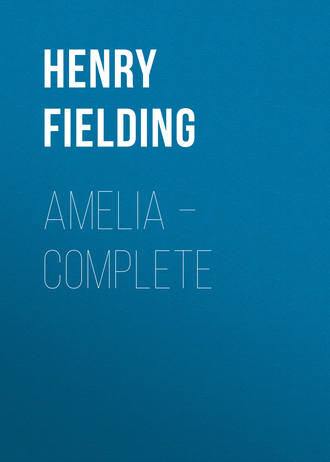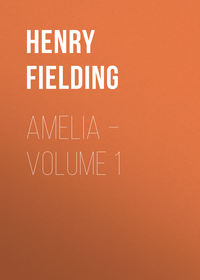 полная версия
полная версияAmelia – Complete
“When I had continued full two hours in these circumstances, I heard a woman’s step tripping upstairs, which I fondly hoped was my Amelia; but all on a sudden the door flew open, and Mrs. Harris herself appeared at it, with a countenance pale as death, her whole body trembling, I suppose with anger; she fell upon me in the most bitter language. It is not necessary to repeat what she said, nor indeed can I, I was so shocked and confounded on this occasion. In a word, the scene ended with my departure without seeing Amelia.”
“And pray,” cries Miss Matthews, “how happened this unfortunate discovery?”
Booth answered, That the lady at supper ordered a bottle of wine, “which neither myself,” says he, “nor the servants had presence of mind to provide. Being told there was none in the house, though she had been before informed that the things came all safe, she had sent for the maid, who, being unable to devise any excuse, had fallen on her knees, and, after confessing her design of opening a bottle, which she imputed to the fellow, betrayed poor me to her mistress.
“Well, madam, after a lecture of about a quarter of an hour’s duration from Mrs. Harris, I suffered her to conduct me to the outward gate of her court-yard, whence I set forward in a disconsolate condition of mind towards my lodgings. I had five miles to walkin a dark and rainy night: but how can I mention these trifling circumstances as any aggravation of my disappointment!”
“How was it possible,” cried Miss Matthews, “that you could be got out of the house without seeing Miss Harris?”
“I assure you, madam,” answered Booth, “I have often wondered at it myself; but my spirits were so much sunk at the sight of her mother, that no man was ever a greater coward than I was at that instant. Indeed, I believe my tender concern for the terrors of Amelia were the principal cause of my submission. However it was, I left the house, and walked about a hundred yards, when, at the corner of the garden-wall, a female voice, in a whisper, cried out, ‘Mr. Booth.’ The person was extremely near me, but it was so dark I could scarce see her; nor did I, in the confusion I was in, immediately recognize the voice. I answered in a line of Congreve’s, which burst from my lips spontaneously; for I am sure I had no intention to quote plays at that time.
“‘Who calls the wretched thing that was Alphonso?’
“Upon which a woman leapt into my arms, crying out – ‘O! it is indeed my Alphonso, my only Alphonso!’ – O Miss Matthews! guess what I felt when I found I had my Amelia in my arms. I embraced her with an ecstasy not to be described, at the same instant pouring a thousand tendernesses into her ears; at least, if I could express so many to her in a minute, for in that time the alarm began at the house; Mrs. Harris had mist her daughter, and the court was presently full of lights and noises of all kinds.
“I now lifted Amelia over a gate, and, jumping after, we crept along together by the side of a hedge, a different way from what led to the town, as I imagined that would be the road through which they would pursue us. In this opinion I was right; for we heard them pass along that road, and the voice of Mrs. Harris herself, who ran with the rest, notwithstanding the darkness and the rain. By these means we luckily made our escape, and clambring over hedge and ditch, my Amelia performing the part of a heroine all the way, we at length arrived at a little green lane, where stood a vast spreading oak, under which we sheltered ourselves from a violent storm.
“When this was over and the moon began to appear, Amelia declared she knew very well where she was; and, a little farther striking into another lane to the right, she said that would lead us to a house where we should be both safe and unsuspected. I followed her directions, and we at length came to a little cottage about three miles distant from Mrs. Harris’s house.
“As it now rained very violently, we entered this cottage, in which we espied a light, without any ceremony. Here we found an elderly woman sitting by herself at a little fire, who had no sooner viewed us than she instantly sprung from her seat, and starting back gave the strongest tokens of amazement; upon which Amelia said, ‘Be not surprised, nurse, though you see me in a strange pickle, I own.’ The old woman, after having several times blessed herself, and expressed the most tender concern for the lady who stood dripping before her, began to bestir herself in making up the fire; at the same time entreating Amelia that she might be permitted to furnish her with some cloaths, which, she said, though not fine, were clean and wholesome and much dryer than her own. I seconded this motion so vehemently, that Amelia, though she declared herself under no apprehension of catching cold (she hath indeed the best constitution in the world), at last consented, and I retired without doors under a shed, to give my angel an opportunity of dressing herself in the only room which the cottage afforded belowstairs.
“At my return into the room, Amelia insisted on my exchanging my coat for one which belonged to the old woman’s son.” “I am very glad,” cried Miss Matthews, “to find she did not forget you. I own I thought it somewhat cruel to turn you out into the rain.” – “O, Miss Matthews!” continued he, taking no notice of her observation, “I had now an opportunity of contemplating the vast power of exquisite beauty, which nothing almost can add to or diminish. Amelia, in the poor rags of her old nurse, looked scarce less beautiful than I have seen her appear at a ball or an assembly.” “Well, well,” cries Miss Matthews, “to be sure she did; but pray go on with your story.”
“The old woman,” continued he, “after having equipped us as well as she could, and placed our wet cloaths before the fire, began to grow inquisitive; and, after some ejaculations, she cried – ‘O, my dear young madam! my mind misgives me hugeously; and pray who is this fine young gentleman? Oh! Miss Emmy, Miss Emmy, I am afraid madam knows nothing of all this matter.’ ‘Suppose he should be my husband, nurse,’ answered Amelia. ‘Oh! good! and if he be,’ replies the nurse, ‘I hope he is some great gentleman or other, with a vast estate and a coach and six: for to be sure, if an he was the greatest lord in the land, you would deserve it all.’ But why do I attempt to mimic the honest creature? In short, she discovered the greatest affection for my Amelia; with which I was much more delighted than I was offended at the suspicions she shewed of me, or the many bitter curses which she denounced against me, if I ever proved a bad husband to so sweet a young lady.
“I so well improved the hint given me by Amelia, that the old woman had no doubt of our being really married; and, comforting herself that, if it was not as well as it might have been, yet madam had enough for us both, and that happiness did not always depend on great riches, she began to rail at the old lady for having turned us out of doors, which I scarce told an untruth in asserting. And when Amelia said, ‘She hoped her nurse would not betray her,’ the good woman answered with much warmth – ‘Betray you, my dear young madam! no, that I would not, if the king would give me all that he is worth: no, not if madam herself would give me the great house, and the whole farm belonging to it.’
“The good woman then went out and fetched a chicken from the roost, which she killed, and began to pick, without asking any questions. Then, summoning her son, who was in bed, to her assistance, she began to prepare this chicken for our supper. This she afterwards set before us in so neat, I may almost say elegant, a manner, that whoever would have disdained it either doth not know the sensation of hunger, or doth not deserve to have it gratified. Our food was attended with some ale, which our kind hostess said she intended not to have tapped till Christmas; ‘but,’ added she, ‘I little thought ever to have the honour of seeing my dear honoured lady in this poor place.’
“For my own part, no human being was then an object of envy to me, and even Amelia seemed to be in pretty good spirits; she softly whispered to me that she perceived there might be happiness in a cottage.”
“A cottage!” cries Miss Matthews, sighing, “a cottage, with the man one loves, is a palace.”
“When supper was ended,” continued Booth, “the good woman began to think of our further wants, and very earnestly recommended her bed to us, saying, it was a very neat, though homely one, and that she could furnish us with a pair of clean sheets. She added some persuasives which painted my angel all over with vermilion. As for myself, I behaved so awkwardly and foolishly, and so readily agreed to Amelia’s resolution of sitting up all night, that, if it did not give the nurse any suspicion of our marriage, it ought to have inspired her with the utmost contempt for me.
“We both endeavoured to prevail with nurse to retire to her own bed, but found it utterly impossible to succeed; she thanked Heaven she understood breeding better than that. And so well bred was the good woman, that we could scarce get her out of the room the whole night. Luckily for us, we both understood French, by means of which we consulted together, even in her presence, upon the measures we were to take in our present exigency. At length it was resolved that I should send a letter by this young lad, whom I have just before mentioned, to our worthy friend the doctor, desiring his company at our hut, since we thought it utterly unsafe to venture to the town, which we knew would be in an uproar on our account before the morning.”
Here Booth made a full stop, smiled, and then said he was going to mention so ridiculous a distress, that he could scarce think of it without laughing. What this was the reader shall know in the next chapter.
Chapter vii. – The story of Booth continued. – More surprising adventures
“From what trifles, dear Miss Matthews,” cried Booth, “may some of our greatest distresses arise!” Do you not perceive I am going to tell you we had neither pen, ink, nor paper, in our present exigency?
A verbal message was now our only resource; however, we contrived to deliver it in such terms, that neither nurse nor her son could possibly conceive any suspicion from it of the present situation of our affairs. Indeed, Amelia whispered me, I might safely place any degree of confidence in the lad; for he had been her foster-brother, and she had a great opinion of his integrity. He was in truth a boy of very good natural parts; and Dr Harrison, who had received him into his family, at Amelia’s recommendation, had bred him up to write and read very well, and had taken some pains to infuse into him the principles of honesty and religion. He was not, indeed, even now discharged from the doctor’s service, but had been at home with his mother for some time, on account of the small-pox, from which he was lately recovered.
“I have said so much,” continued Booth, “of the boy’s character, that you may not be surprised at some stories which I shall tell you of him hereafter.
“I am going now, madam, to relate to you one of those strange accidents which are produced by such a train of circumstances, that mere chance hath been thought incapable of bringing them together; and which have therefore given birth, in superstitious minds, to Fortune, and to several other imaginary beings.
“We were now impatiently expecting the arrival of the doctor; our messenger had been gone much more than a sufficient time, which to us, you may be assured, appeared not at all shorter than it was, when nurse, who had gone out of doors on some errand, came running hastily to us, crying out, ‘O my dear young madam, her ladyship’s coach is just at the door!’ Amelia turned pale as death at these words; indeed, I feared she would have fainted, if I could be said to fear, who had scarce any of my senses left, and was in a condition little better than my angel’s.
“While we were both in this dreadful situation, Amelia fallen back in her chair with the countenance in which ghosts are painted, myself at her feet, with a complexion of no very different colour, and nurse screaming out and throwing water in Amelia’s face, Mrs. Harris entered the room. At the sight of this scene she threw herself likewise into a chair, and called immediately for a glass of water, which Miss Betty her daughter supplied her with; for, as to nurse, nothing was capable of making any impression on her whilst she apprehended her young mistress to be in danger.
“The doctor had now entered the room, and, coming immediately up to Amelia, after some expressions of surprize, he took her by the hand, called her his little sugar-plum, and assured her there were none but friends present. He then led her tottering across the room to Mrs. Harris. Amelia then fell upon her knees before her mother; but the doctor caught her up, saying, ‘Use that posture, child, only to the Almighty!’ but I need not mention this singularity of his to you who know him so well, and must have heard him often dispute against addressing ourselves to man in the humblest posture which we use towards the Supreme Being.
“I will tire you with no more particulars: we were soon satisfied that the doctor had reconciled us and our affairs to Mrs. Harris; and we now proceeded directly to church, the doctor having before provided a licence for us.”
“But where is the strange accident?” cries Miss Matthews; “sure you have raised more curiosity than you have satisfied.”
“Indeed, madam,” answered he, “your reproof is just; I had like to have forgotten it; but you cannot wonder at me when you reflect on that interesting part of my story which I am now relating. – But before I mention this accident I must tell you what happened after Amelia’s escape from her mother’s house. Mrs. Harris at first ran out into the lane among her servants, and pursued us (so she imagined) along the road leading to the town; but that being very dirty, and a violent storm of rain coming, she took shelter in an alehouse about half a mile from her own house, whither she sent for her coach; she then drove, together with her daughter, to town, where, soon after her arrival, she sent for the doctor, her usual privy counsellor in all her affairs. They sat up all night together, the doctor endeavouring, by arguments and persuasions, to bring Mrs. Harris to reason; but all to no purpose, though, as he hath informed me, Miss Betty seconded him with the warmest entreaties.”
Here Miss Matthews laughed; of which Booth begged to know the reason: she, at last, after many apologies, said, “It was the first good thing she ever heard of Miss Betty; nay,” said she, “and asking your pardon for my opinion of your sister, since you will have it, I always conceived her to be the deepest of hypocrites.”
Booth fetched a sigh, and said he was afraid she had not always acted so kindly; – and then, after a little hesitation, proceeded:
“You will be pleased, madam, to remember the lad was sent with a verbal message to the doctor: which message was no more than to acquaint him where we were, and to desire the favour of his company, or that he would send a coach to bring us to whatever place he would please to meet us at. This message was to be delivered to the doctor himself, and the messenger was ordered, if he found him not at home, to go to him wherever he was. He fulfilled his orders and told it to the doctor in the presence of Mrs. Harris.”
“Oh, the idiot!” cries Miss Matthews. “Not at all,” answered Booth: “he is a very sensible fellow, as you will, perhaps, say hereafter. He had not the least reason to suspect that any secrecy was necessary; for we took the utmost care he should not suspect it. – Well, madam, this accident, which appeared so unfortunate, turned in the highest degree to our advantage. Mrs. Harris no sooner heard the message delivered than she fell into the most violent passion imaginable, and accused the doctor of being in the plot, and of having confederated with me in the design of carrying off her daughter.
“The doctor, who had hitherto used only soothing methods, now talked in a different strain. He confessed the accusation and justified his conduct. He said he was no meddler in the family affairs of others, nor should he have concerned himself with hers, but at her own request; but that, since Mrs. Harris herself had made him an agent in this matter, he would take care to acquit himself with honour, and above all things to preserve a young lady for whom he had the highest esteem; ‘for she is,’ cries he, and, by heavens, he said true, ‘the most worthy, generous, and noble of all human beings. You have yourself, madam,’ said he, ‘consented to the match. I have, at your request, made the match;’ and then he added some particulars relating to his opinion of me, which my modesty forbids me to repeat.” – “Nay, but,” cries Miss Matthews, “I insist on your conquest of that modesty for once. We women do not love to hear one another’s praises, and I will be made amends by hearing the praises of a man, and of a man whom, perhaps,” added she with a leer, “I shall not think much the better of upon that account.” – “In obedience to your commands, then, madam,” continued he, “the doctor was so kind to say he had enquired into my character and found that I had been a dutiful son and an affectionate brother. Relations, said he, in which whoever discharges his duty well, gives us a well-grounded hope that he will behave as properly in all the rest. He concluded with saying that Amelia’s happiness, her heart, nay, her very reputation, were all concerned in this matter, to which, as he had been made instrumental, he was resolved to carry her through it; and then, taking the licence from his pocket, declared to Mrs. Harris that he would go that instant and marry her daughter wherever he found her. This speech, the doctor’s voice, his look, and his behaviour, all which are sufficiently calculated to inspire awe, and even terror, when he pleases, frightened poor Mrs. Harris, and wrought a more sensible effect than it was in his power to produce by all his arguments and entreaties; and I have already related what followed.
“Thus the strange accident of our wanting pen, ink, and paper, and our not trusting the boy with our secret, occasioned the discovery to Mrs. Harris; that discovery put the doctor upon his metal, and produced that blessed event which I have recounted to you, and which, as my mother hath since confessed, nothing but the spirit which he had exerted after the discovery could have brought about.
“Well, madam, you now see me married to Amelia; in which situation you will, perhaps, think my happiness incapable of addition. Perhaps it was so; and yet I can with truth say that the love which I then bore Amelia was not comparable to what I bear her now.” “Happy Amelia!” cried Miss Matthews. “If all men were like you, all women would be blessed; nay, the whole world would be so in a great measure; for, upon my soul, I believe that from the damned inconstancy of your sex to ours proceeds half the miseries of mankind.”
That we may give the reader leisure to consider well the foregoing sentiment, we will here put an end to this chapter.
Chapter viii. – In which our readers will probably be divided in their opinion of Mr. Booth’s conduct
Booth proceeded as follows: —
“The first months of our marriage produced nothing remarkable enough to mention. I am sure I need not tell Miss Matthews that I found in my Amelia every perfection of human nature. Mrs. Harris at first gave us some little uneasiness. She had rather yielded to the doctor than given a willing consent to the match; however, by degrees, she became more and more satisfied, and at last seemed perfectly reconciled. This we ascribed a good deal to the kind offices of Miss Betty, who had always appeared to be my friend. She had been greatly assisting to Amelia in making her escape, which I had no opportunity of mentioning to you before, and in all things behaved so well, outwardly at least, to myself as well as her sister, that we regarded her as our sincerest friend.
“About half a year after our marriage two additional companies were added to our regiment, in one of which I was preferred to the command of a lieutenant. Upon this occasion Miss Betty gave the first intimation of a disposition which we have since too severely experienced.”
“Your servant, sir,” says Miss Matthews; “then I find I was not mistaken in my opinion of the lady. – No, no, shew me any goodness in a censorious prude, and – ”
As Miss Matthews hesitated for a simile or an execration, Booth proceeded: “You will please to remember, madam, there was formerly an agreement between myself and Mrs. Harris that I should settle all my Amelia’s fortune on her, except a certain sum, which was to be laid out in my advancement in the army; but, as our marriage was carried on in the manner you have heard, no such agreement was ever executed. And since I was become Amelia’s husband not a word of this matter was ever mentioned by the old lady; and as for myself, I declare I had not yet awakened from that delicious dream of bliss in which the possession of Amelia had lulled me.”
Here Miss Matthews sighed, and cast the tenderest of looks on Booth, who thus continued his story: —
“Soon after my promotion Mrs. Harris one morning took an occasion to speak to me on this affair. She said, that, as I had been promoted gratis to a lieutenancy, she would assist me with money to carry me yet a step higher; and, if more was required than was formerly mentioned, it should not be wanting, since she was so perfectly satisfied with my behaviour to her daughter. Adding that she hoped I had still the same inclination to settle on my wife the remainder of her fortune.
“I answered with very warm acknowledgments of my mother’s goodness, and declared, if I had the world, I was ready to lay it at my Amelia’s feet. – And so, Heaven knows, I would ten thousand worlds.
“Mrs. Harris seemed pleased with the warmth of my sentiments, and said she would immediately send to her lawyer and give him the necessary orders; and thus ended our conversation on this subject.
“From this time there was a very visible alteration in Miss Betty’s behaviour. She grew reserved to her sister as well as to me. She was fretful and captious on the slightest occasion; nay, she affected much to talk on the ill consequences of an imprudent marriage, especially before her mother; and if ever any little tenderness or endearments escaped me in public towards Amelia, she never failed to make some malicious remark on the short duration of violent passions; and, when I have expressed a fond sentiment for my wife, her sister would kindly wish she might hear as much seven years hence.
“All these matters have been since suggested to us by reflection; for, while they actually past, both Amelia and myself had our thoughts too happily engaged to take notice of what discovered itself in the mind of any other person.
“Unfortunately for us, Mrs. Harris’s lawyer happened at this time to be at London, where business detained him upwards of a month, and, as Mrs. Harris would on no occasion employ any other, our affair was under an entire suspension till his return.
“Amelia, who was now big with child, had often expressed the deepest concern at her apprehensions of my being some time commanded abroad; a circumstance, which she declared if it should ever happen to her, even though she should not then be in the same situation as at present, would infallibly break her heart. These remonstrances were made with such tenderness, and so much affected me, that, to avoid any probability of such an event, I endeavoured to get an exchange into the horse-guards, a body of troops which very rarely goes abroad, unless where the king himself commands in person. I soon found an officer for my purpose, the terms were agreed on, and Mrs. Harris had ordered the money which I was to pay to be ready, notwithstanding the opposition made by Miss Betty, who openly dissuaded her mother from it; alledging that the exchange was highly to my disadvantage; that I could never hope to rise in the army after it; not forgetting, at the same time, some insinuations very prejudicial to my reputation as a soldier.
“When everything was agreed on, and the two commissions were actually made out, but not signed by the king, one day, at my return from hunting, Amelia flew to me, and eagerly embracing me, cried out, ‘O Billy, I have news for you which delights my soul. Nothing sure was ever so fortunate as the exchange you have made. The regiment you was formerly in is ordered for Gibraltar.’









